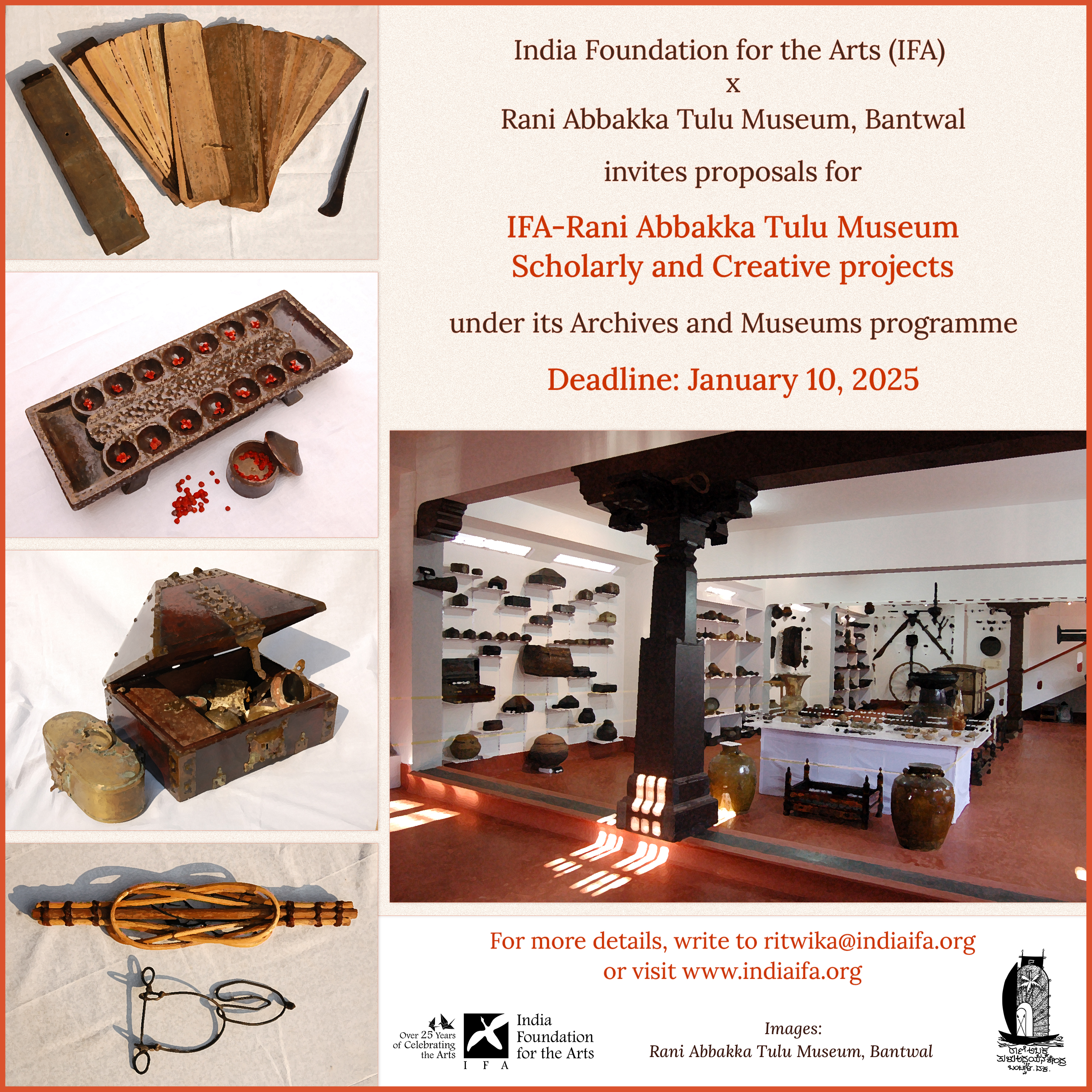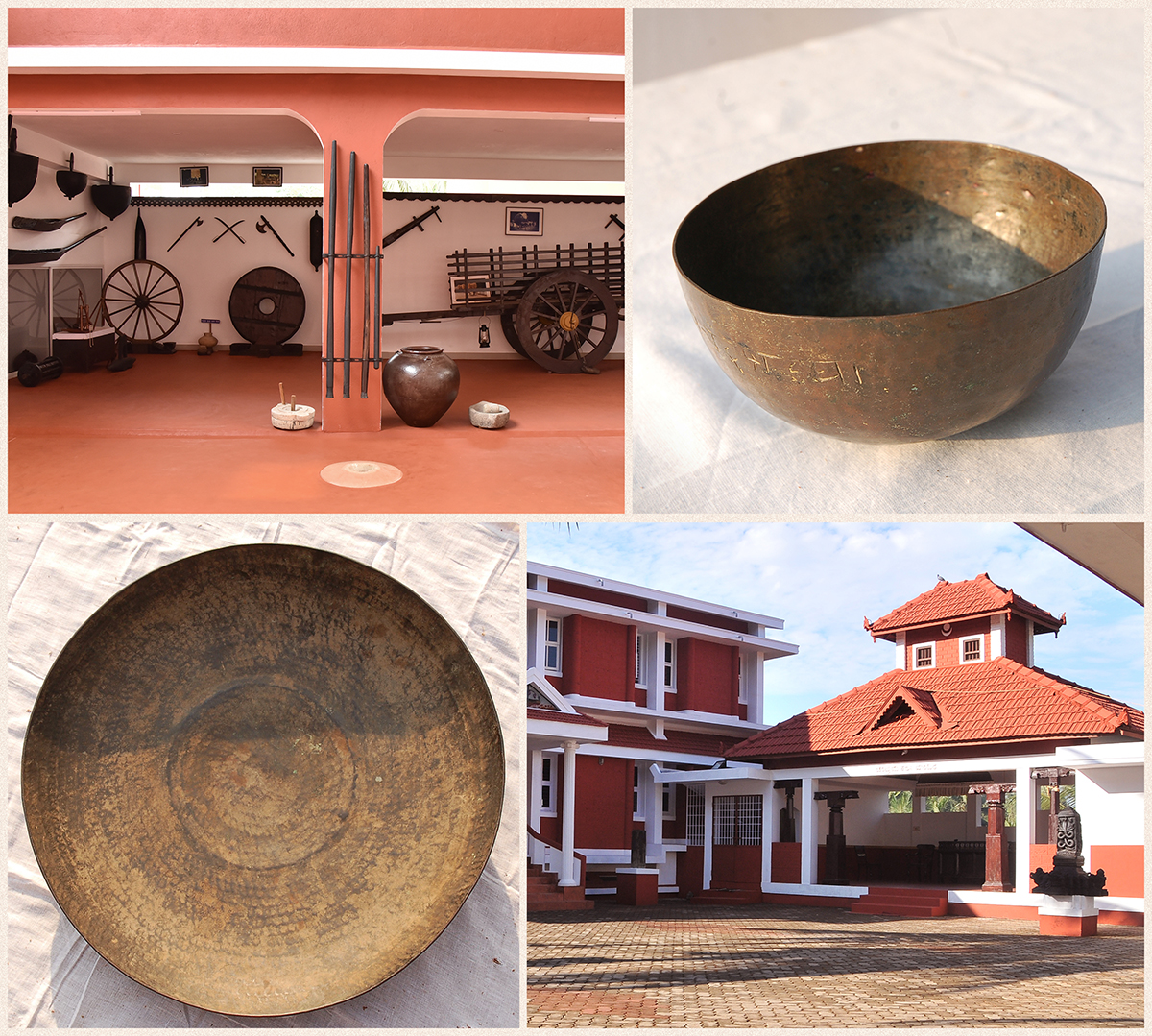Request for Proposals: IFA x Tulu Museum | Deadline: January 10, 2025 (CLOSED)

IFA, in collaboration with Rani Abbakka Tulu Museum, invites applications for IFA-Rani Abbakka Tulu Museum Scholarly and Creative projects, under our Archives and Museums programme. This programme has a twofold objective: to provide arts practitioners and researchers with an opportunity to generate new, critical and creative approaches for public engagement with archives and museum collections; and to energise these spaces as platforms for dialogue and discourse. Read about earlier projects under this programme.
Deadline: January 10, 2025
Click here to read the call in Kannada.
About Rani Abbakka Tulu Museum:
Rani Abbakka Tulu Museum in Bantwal, Karnataka is dedicated to preserving and showcasing the rich cultural heritage of Tulu Nadu. Named after the queen Rani Abbakka, who valiantly fought against Portuguese colonialism, the museum is a tribute to her legacy and the lush history of Tulu Nadu.
Founded and curated by a retired history Professor Dr Thukaram Poojary, the museum houses an extensive collection of artefacts and historical relics that tell the story of the region's past. In addition to the artefacts, the museum houses a library named after SU Paniyadi, a numismatics section, and an art gallery dedicated to Rani Abbakka. The museum aims to educate visitors about the unique traditions, art forms, folklore and history of the Tulu people, fostering a deeper appreciation for our cultural roots.
About the Collection:
The Rani Abbakka Tulu Museum is renowned for studying the history of the region through oral history, material culture, performing arts, social and religious rites and rituals. The collection includes ceremonial objects and sculptures that highlight the profound cultural significance of these practices.
An array of artefacts related to the Daivas—the divine spirits worshipped in Tulu Nadu—provides deep insights into the region's spiritual traditions. Artefacts related to agrarian life, such as ancient agricultural tools and implements, offer a glimpse into the traditional farming practices and its evolution that sustained the community for generations. Everyday objects, from kitchen utensils to household items, gives a vivid insight into daily life in Tulu Nadu.
The entire collection at the museum will be available for the projects taken up under the collaboration.

About the Scope of the Scholarly and Creative Projects:
We encourage projects that demonstrate an ability to think through interdisciplinary and collaborative approaches and methodologies for their outcomes. Applications can artistically engage with the entire collection. However, this is not mandatory and projects may focus on any one key aspect of the museum as well.
For the Scholarly Project, we encourage proposals that can
- research and critically engage with the collection
- create content to support the knowledge bank of the institution with tangible outcomes such as digital inventory with photographs, monographs, essays, research based comprehensive and illustrated catalogue for selected objects in the museum etc.
- present their research through public programmes both online and offline.
For the Creative Project, we seek proposals which
- demonstrate innovative curatorial and artistic intervention to reimagine the collection by exploring histories of material culture, for example create audio-visual documentation by focusing on the concept of history through objects
- record oral history based on the museum objects and the collection that encapsulates the history of Tulu Nadu and Rani Abbakka
- aim to create outcomes such as podcasts, animation films, workshops, exhibitions etc. based on the collection of the museum
- present an opportunity for programming and outcomes for greater public outreach and engagement for the museum
Please note that outcomes are merely suggestions, we look forward to outcomes that are conducive to the applicants’ interest as well.
Project Coordinators working on the Creative and Scholarly projects will be required to visit, study and research the collections at the physical space of the museum in Bantwal, Karnataka. Project Coordinators will have access to the specific materials mentioned above, over the duration of the project. Applicants with knowledge of Kannada and Tulu, who are keen to produce work in these Indian languages, are encouraged to apply.
For more information about the collection and materials available for research, please contact Dr Thukaram Poojary at 9449165762 and Sindhura TP at 8105832789 or write at tpsindhura@gmail.com
Project Timeline: Both kinds of projects are envisioned for a period of 15 months.
Applicant Profile:
- We seek applications from curators, artists, art-educators, researchers, writers, performers as well as other creative practitioners, and scholars with a background in research and a keen interest in working with museum collections.
- Only Indian nationals are eligible to apply. To know more about our eligibility criteria, click here.
Budget:
- The project cost should not exceed Rs 3,00,000/-
- You can request for an honorarium not exceeding 30% of the proposed budget for the entire duration of the project. The total amount is inclusive of the honorarium.
Funds will cover only project-related costs and activities, and will not pay for infrastructure costs or equipment purchase.
Submission Guidelines:
Send us the following in a single email:
- A proposal briefly describing the project (as described in the call with outlines of creative outcomes that one can imagine, or research questions if it is a Scholarly project) that could be developed from the visual and textual materials mentioned above. The description should include the vision, approach and possible outcomes.
- A brief note on other public programmes that could be developed from the material.
- Detailed timeline for the project.
- Detailed budget.
- Your CV with a brief description of a project you have been involved with as a curator, arts practitioner, or researcher. This description should comprise the vision, processes, and outcomes from that project. Please send us a document with links and not attachments.
- You can write your proposal in any Indian language, including English.
Email your applications or any queries to Ritwika Misra at ritwika@indiaifa.org with the subject line: Application for IFA-Rani Abbakka Tulu Museum Project
Key Dates:
- The deadline for receiving applications is January 10, 2025.
- Interviews with shortlisted candidates are expected to take place in February 2025.
- The project will commence by February 2025 for a period of 15 months.
IFA will implement this project with you directly as Project Coordinator.
Please note that IFA is committed to creating a safe environment that supports, respects, and protects everyone, including children. The applicant must be aligned with this and must uphold it at all times.
